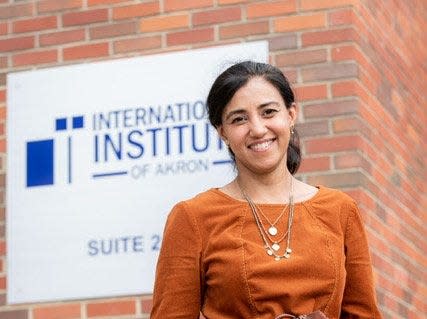Asylum restriction has created a humanitarian crisis at the border; it’s time to end it
In June 2021, a local Akron resident left a frantic message on my voicemail; her cousin was lost near McAllen, Texas, along the U.S.-Mexico border. The young woman fled Mexico due to gang violence, and the smugglers she hired abandoned her after sending her family a terrifying video of her lying on the ground unconscious. As an immigration lawyer and executive director of the International Institute of Akron, I knew we needed to enlist a more powerful entity, so I called the FBI. When we finally located her, she was dehydrated and thankfully still alive.
This ordeal put a young woman’s life in danger. It’s only one example of the havoc wreaked by Title 42, a policy that allows border authorities to turn away people seeking asylum in favor of public health protections. The Biden administration planned to lift the measure in May — and for good reason. It has created a surge of dangerous border crossings, displaced millions of people, and produced an avoidable humanitarian crisis. Instead, more than 20 states, including Ohio, pushed to keep the measure in place. Last month, a federal judge in Louisiana complied.
Title 42 was enacted in March 2020 to stop the spread of COVID-19. Before that, asylum seekers could present themselves at a border checkpoint and make their case for safe haven, as permitted by U.S. immigration law. While the asylum process is far from perfect, closing the border caused a distressing ripple effect. It pushed desperate people to cross at unsafe locations, such as rivers or heat-stricken land, where many get sick or die. While they wait for the border to reopen, asylum seekers have flooded Mexican border cities, where they lack basic necessities like food, medicine and shelter and are at risk of kidnappings and violence.
I’m enraged by the senseless inhumanity this policy has caused. Without Title 42, the young woman we helped could have gone to a border checkpoint and requested asylum. Instead, she was forced to risk physical harm, requiring the intervention of the FBI, and causing her family immense distress.
This story should enrage Americans too. Our country has long been a refuge for people fleeing persecution and violence, yet Title 42 has shut the door on them. There might have been a case for the policy at the height of COVID, but public health officials have deemed it no longer necessary or effective. Instead, continuing to invoke Title 42 violates U.S. immigration laws, due process and international treaties.
Many states in favor of this public health policy are the same ones that took a lax approach to mask mandates and vaccine requirements. Why the sudden concern about the spread of COVID when it relates to immigration?
These same states, Ohio included, have been vocal about their desire to welcome certain asylum seekers into the country — including Ukrainians fleeing the Russian invasion who are granted an exemption from Title 42 and allowed to petition for asylum at the border. So why welcome families from Ukraine but not families from Haiti or Central and South America who are also fleeing violence?
There are layers of hypocrisy here. The simple truth is that some political leaders would rather our country close its borders entirely or pick and choose the people we let in based on their ethnicity and race. That’s not the America I know and believe in.
In my line of work, I am regularly in touch with political leaders and families in Ohio who care deeply about welcoming refugees here. They understand these newcomers bring vibrancy, culture, and spirit. Eager to rebuild their lives, refugees start new businesses at high rates, and they, along with other immigrants, help counterbalance our population decline, strengthening our economy. They share our values, too. Refugees of all races and religions resettle in our state because we put family first, and our communities are close-knit.
Title 42 assumes that the people who want and need to come here aren’t like us. Of course they are. I know this because I’ve seen ordinary Ohioans open their hearts and homes to newcomers. I’ve seen how the give and take between a newcomer and native-born Ohioans builds stronger neighborhoods, towns and cities.
It’s time for the U.S. to get its priorities straight. If we really care about a border process that is safe, fair, and efficient, then let’s invest in that strategy. The Department of Homeland Security should focus its efforts on streamlining the asylum process at our ports of entry, ensure those who cross aren’t detained under inhumane conditions, and funnel resources toward building up resettlement infrastructure.
Title 42 has created a dangerous bottleneck at the border — one that will only worsen if we don’t restore our asylum system. Let’s lean into our legacy as a nation of welcome and end Title 42.
Madhu Sharma is the executive director and director of legal services of the International Institute of Akron.

This article originally appeared on Akron Beacon Journal: International Institute chief urges end to Title 42 order
